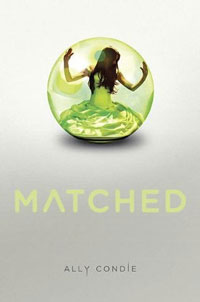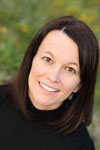 “Matched,” by Ally Condie (Nov. 2010), is the first book in a planned trilogy (the second book, Crossed, arrives in November 2011). This is juvenile fiction set in a dystopian society. I read it on my Nook.
“Matched,” by Ally Condie (Nov. 2010), is the first book in a planned trilogy (the second book, Crossed, arrives in November 2011). This is juvenile fiction set in a dystopian society. I read it on my Nook.
There’s a word I’ve not used before–dystopian. That term refers to a futuristic society which appears utopian, but is repressive and authoritarian. It’s a negative utopia. Dystopias often require conformity to a regimented social order. Other examples from literature and film would be 1984, Farenheit 451, Logan’s Run, Minority Report, The Handmaid’s Tale, Rollerball, Brave New World, Aeon Flux, Clockwork Orange, and the Hunger Games trilogy.
Movies like Bladerunner and Soylent Green are futuristic, but not utopian. And movies like Mad Max and the Postman are post-apocalyptic, but neither futuristic nor utopian–just set in the future.
“Matched” revolves around Cassia, a girl living in a world where the Society (the government) controls and predicts everything. (The cover, with a girl enclosed in a green bubble, excellently portrays that.) The book starts with Cassia being matched–learning who the government has decided she will marry. This is a big event, a special day, something young people eagerly await. They willing accept their Match, because the Society knows best.
As it turns out, Cassia is matched with her best friend, Xander (it’s rare that you’re matched with somebody you know). But when she plugs in a data card containing information about her match, she briefly sees the face of another boy she knows, Ky. An Official comes to talk to her, telling her this was a mistake. But it gets her wondering, and she begins questioning the rules of her world.

Allie Condie
As the author said in an interview on Amazon, the book is about Cassia “learning to choose.” She loves Xander, who is a genuinely Good Guy, but is intrigued by Ky, who has a mysterious past and knows things other people don’t. Also, he’s an Aberration–a classification far beneath Cassia’s social status, something for people who don’t fit in. As an Aberration, Ky can never be matched, and his role in life will never get better than working in the garbage processing plant.
It’s kind of a love story, or an infatuation story, as Cassia’s friendship with Ky deepens. And there’s obviously a love triangle. But it’s all G-rated, innocent. I think there was a kiss, but nothing beyond that.
Condie builds a society that seems perfect. The government controls everything, but in a way people accept. It’s not a heavy-handed police state, at least not where Cassia lives. In the outer regions, where Ky is from–that’s a different story, though this book doesn’t tell us much about it. There are many Officials–both of Cassia’s parents are Officials–who have extra authority in the Society. But nobody’s carrying a weapon, nobody gets imprisoned. It’s a benevolent dystopia.
The Society determines who you marry, what job you’ll have, what you eat (meals are delivered, with portions and enrichments tailored for each person), and even when you die. Everyone dies on their 80th birthday.
If anyone bucks the system, shows individuality, they can be Reclassified. That’s what happened to Ky, as a result of transgressions by his parents. But it’s even worse to be an Anomaly. Condie never really explains the ramifications of this classification; we just know it’s the lowest rung on the ladder.
The book alludes to an earlier world, which is clearly our world. People are allowed to own one “relic” from the past. In Cassia’s case, it’s a compact. Most everything else from the World That Was has been destroyed.
Cassia, who tells the story first-person, says:
You never know when technology might fail. That’s what happened to the society before ours. Everyone had technology, too much of it, and the consequences were disastrous. Now, we have the basic technology we need–ports, readers, scribes–and our information intake is much more specific. Nutrition specialists don’t need to know how to program air trains, for example, and programmers, in turn, don’t need to know how to prepare food. Such specialization keeps people from becoming overwhelmed. We don’t need to understand everything.
When it comes to culture, the Society kept 100 of everything and ditched the rest. There are the Hundred Poems, Hundred Paintings, Hundred Songs, Hundred Stories. Everyone knows and studies these, but nothing more. The Society had decided their culture was too cluttered, “and everyone believed because it made sense. How can we appreciate anything fully when overwhelmed with too much?”
Cassia’s grandmother was one of the cultural historians who helped select the Hundred Poems. But she receives from her grandfather a Dylan Thomas poem he has secreted away, “Do Not Go Gentle.” This poem plays an important role in the book, a continuing theme which motivates much of Cassia’s thinking and actions.
Condie draws an interesting world, with plenty of details, and yet there’s so much I don’t know about it. The Hunger Games struck me the same way. I’ve read only the first book in each of these series, and will definitely read the others. I’m sure more of this futuristic world–how it developed, who is in control, etc.–will unfold in subsequent books. I guess Condie provided enough, for now.






2 Comments to Book: “Matched,” by Ally Condie